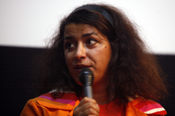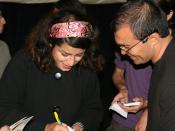Persepolis is based on the true life story of Marjane Satrapi, depicting the struggle people when through in the Islamic republic of Iran. I chose the movie as I seek to identify the self and other relationship in power in the state especially of Iran.
The movie is about Marjane Satrapi life during the Revolution of Iran and after that. This movie has been constructed based on a book called Persepolis written by Marjane Satrapi. The movie has been directed by herself and a French director, Vincent Paronnaaud.
Marjane has grown in a Marxist family as we can see she speaks with God and Marx in her dreams. Before the Revolution his uncle and some of her family's friends had been imprisoned by the state of Shah (king of Iran) they fought against of the state. After the Revolution, when the fundamentalists and religious forces rose to power, many of them were imprisoned or executed or many of them had to leave Iran.
Some years later and during the Iran/Iraq war, Marjane's parents made a difficult decision to send her to school in Austria because of her safety. Marjane lived and gained some experiences there but after high school she found herself alone and home sick. So, she decided to return to Iran.
In Iran she could enter art school and get married. At age 24, she realized that she cannot live in Iran. Then she makes a decision to leave her country for France.
The movie starts with the days of Revolution of Iran. Before the Revolution, there was a kingship state (Pahlavi) in Iran. Iran has had the most traditional of shape of state that is kingship. This kind of state begins with Empire of Iran in the 6th century BC by Great Cyrus.
King ship is a traditional kind of totalitarian power that power concentrates in an individual (king). King knows itself as a certain destiny of a nation. King presents his power as a divine vocation. We can see in the movie that Marjane tells father:-As for myself, I think I love the Shah. He's been chosen by God. God himself told me, the teacher too.
So, we can see that power influence in education institutions, like other institutions, that King is a divine power. In such state power is patrimonial. This patrimonial power means force and fate for people. Such power is rough in according to the movie we can see that Shah imprison or execute the people who oppose him and in the revolts in 1979 he uses of weapon for crushing them.
I would like to mention Max Weber work about power and domination. He distinguished three pure types of political leadership and domination: Charismatic domination, Traditional domination and Legal domination.
Traditional domination means patriarch, patrimonial is like a kingship state. Fritz.K.Ringer according to Weber:⦠rests upon belief in the sanctity of rules and powers that have "always existed."â¦. obedience is due not to rules but to the person of the rules, who either occupies his position by tradition or has been chosen for it by a traditional lord. If the ruler's actions provoke resistance it is directed against the person of the lord who has exceeded the bounds of tradition, not against tradition itself. (Ringer, 2003, p. 184)This type of power is accepted by dominant group and individual or not challenged by subordinate individuals. This authority depends on a myth or symbol, according to state of Iran emphasized to nationalism and race. But, Shah ignored Iranian people's religious oriented. So, we see that during the Revolution, people tended to a religious leader despite of fights of Communist parties.
Leadership of Revolution by Ayatollah Khomaini, is the same thing that Weber calls charismatic domination. Fritz.K.Ringer according to Weber:Weber initially defined charisma as a "quality" of a personality "that is considered extraordinary". This quality consists of supernatural or superhuman gifts and its "God-sent" possessor is esteemed a "leader". Weber noted that the quality may originally have been "magically" grounded, and he offered a variety of examples, from prophets to heroic warlords. (Ringer, 2003, p. 186)The basis of this power is recognition and acceptance of the leader by the people. This power with support of followers can lead to a revolution and breaking traditional rule. This charismatic domination in Iran, after revolution and with beginning of Iran/Iraq war, helped to the government of Iran to put up a resistance both against of opposition parties like Communists and Mojahedin and against of attack of Iraq. We can see in the movie how government sends the young people to war by helping of religious belief, filling their head with false ideology and propaganda to promote their causes. In a scene, Mrs. Nasrin says:-They (teachers) gave a key to my son at school; they told them if they died in combat, they would go to heaven with this key!The government fought both against foreign enemy(Iraq) and against inland enemy(opposition parties). In fact, the government, for suppressing of oppositions, chose the same method that Shah did it like any totalitarian regime: prison and execution. In the movie Marjane says:-Arrests and executions increased. The new government established even more repressive laws.
Overall, in such conditions, people are not passive. Power and resistance are two sides of the same coin. The government forbids listening music, drinking alcohol, party and even it makes veil for women compulsory. But people make party and drink in hiding.
History teaches that rise to power and responsibility affects deeply the nature of revolutionary parties. Experience and common sense were perfectly justified in expecting that totalitarianism in power would gradually lose its revolutionary momentum and utopian character, that the everyday business of government and the possession of real power would moderate the pre-power claims of the movements and gradually destroy the fictitious world of their organization. (Arendt, 1958, p. 392)The desire for freedom often inspires people to resist even the most brutal form of aggressions and in this mad drive for change, such as the type the Iranians crave for the overthrowing the Shah they blinding embrace the unknown which could possibly be worse as the little Marjane shows her rebellion when she begins to come to grasp with the constructed reality before her. When confronted by her religion teacher.
Teacher: "Thanks to the new government we no longer have any political prisoners left, we finally earned our freedom.
Marjane: it is the new government that ordered the execution of my uncle, from 3000 prisoners of the Shah we have 300,000 with you, and how dare you lie?The little girl's bravery although not approved by her mother shows how a totalitarian government can only create seeds of rebellion in a government, people or corporation.
Also the movie depicts the role how religion is manipulated and used as a tool to control the people, a situation where their perceived enemies are hunted and kill even in the face of the threat of invasion by Iraq. While the movie like all good true representations of a totalitarian society which Iran is still embroiled in reacted violently to the movies release.
Reaction of Iranian governmentThe film has drawn complaints from the Iranian government. Even before its debut at the Cannes Film Festival, the government-connected organization Iran Farabi Foundation sent a letter to the French embassy in Tehran stating, "This year the Cannes Film Festival, in an unconventional and unsuitable act, has chosen a movie about Iran that has presented an unrealistic face of the achievements and results of the glorious Islamic Revolution in some of its parts.[7]Despite such objections, the Iranian cultural authorities relented in February 2008 and allowed limited screenings of the film in Tehran, albeit with half a dozen scenes censored due to sexual content.(Wikipedia)While in an apparent desire to save their kid from oppression they send her to Europe an act which is still very much in practice today, it is an established fact that North Cyprus is increasing becoming a safe haven for parents to send their children in the name of studies, I see a relations here like marjane parents desperate to flee the tyrannical oppression the Iranian people are still subjected to. I speak of this because I can relate to the story of marjane. I like her fell in love with western movies but which are now banned in today's public, however like the story these only fuels the black market and we seek to escape from the unpleasant realities we are faced with the Islamic government of Iran.
Finally I would like to state that I find the movie rich in attacking the constructs of manipulation and propaganda religion advocates in the power relationship of the state.
We find a situation where the people who are disgusted with the Shah and decide to do away the western back government because of the unfair conditions here the Hegelian dialect comes to play after the uprising and revolution. We find the new republic filled with same dictatorship and violence it rose again (finding them right in the middle of things they were trying to oppose). This also shows how dictatorship is easily conceived in regards to the fact that the 'personal is political' as explained by Foucault.
While the movie itself is a master piece that it depicts so eloquently the scenarios that prevailed the uprising of Iran Islamic state. I am personally mortified at the human rights abuses, people particularly women are subjected to perhaps this explains why I have a special affection for the person of maryjane because it is almost a reflection of my life and experiences as a young lady growing up under the changes of one government to another. Perhaps I feel like her and like all women who are oppressed not just in Iran but to a larger context with regards to the world which is built in a patriarchal society.
Finally my criticisms of the movies also involves the stereo typing of men as abusive, corrupt, and power hungry, the only man not portrayed in a bad light in all his actions was the men associated with marjane, her father, uncle or friends of family. Another observation is that despite the fact that it may have portrayed some real life scenarios of the maryjane this is always the possibility that it may have been sexed up, to satisfy the demands of the industry to make it worth watching, perhaps or it could also be a deliberate attempt to ridicule and cause more criticisms on the Iranian governments because of the self and other relationship that exists between the western world and the rest of developing countries this of course is an unconditional secret that we may never know or understand.
Refrences:Ringer, F. (2003). From history to sociology. In F. Ringer, Max Weber An intellectual biography (pp. 175-186). Chicago: University of chicago press.
Arendt, H. (1958). Totalitarianism in power. In H. Arendt, The origins of totalitaianism (pp. 389-460). Ohio: The world publishing compony.
http://en.wikipedia.org/wiki/Persepolis_(film)


